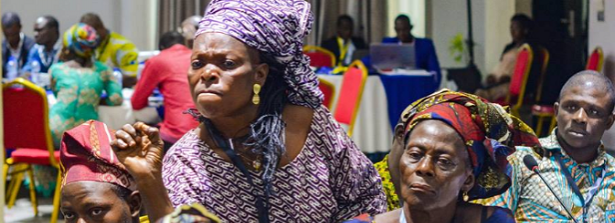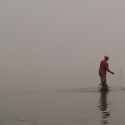Report of workshop on resilience of inland fishing in Benin

October 31, 2018
Image: ACED
On September 18, 2018, ACED, LHA and ACWFS organized a workshop in the context of the Applied Research Fund (ARF) project “Improving resilience of inland fisher communities in Benin”. The aim of the workshop was to improve the uptake of research results by policymakers and to strengthen their engagement in the sector. During the workshop a framework was created where especially women involved in inland fisheries have sent their messages to policy makers, researchers and other actors in the sector.
Please find below the six key messages of the workshop:
- The impacts of human activities on the Lake Nokoué and Porto-Novo Lagoon complex are enormous and visible. Water, fish and riverbanks are significantly polluted by heavy metals (especially lead and mercury), fermentable materials, cans and plastic waste.
- The various stakeholders have different perceptions about the use of “acadja”, which is the most intensive and productive fishing technique on the lagoon complex. Government authorities support its ban and the removal of existing facilities on the lake. On the issue of the management of inland fisheries, researchers and scientists emphasize that the “acadja” technique is not bad, but it is rather its uncontrolled development that has negative effects on the lagoon complex. As for the fishermen, they call for better consultation with stakeholders to achieve a more efficient regulation of fishing techniques.
- Fishing communities are facing organizational difficulties, resurgent conflicts, declining fish catches, food insecurity and illiteracy. To deal with these challenges, practical solutions are formulated as follows: combat the pollution of the lakes by focusing on sources of pollution; effectively implement legislation on fishing without political interference; invest in the education of children in fishing communities; and promote alternative economic activities to fishing, such as the processing of water hyacinth, aquaculture and market gardening.
- These solutions go beyond individual actions and require the commitment of various actors, notably public policies, to sustainably strengthen the fishing communities’ capacities over the long term. To this end, initial reflections have been formulated on the creation of a multi-stakeholder platform to improve the performance of the inland fisheries sector. ACED will continue to engage stakeholders for the effective implementation of this platform.
- The implementation of large scale solutions that mobilize all stakeholders requires the commitment of policy makers including the Ministry of Agriculture, Livestock and Fisheries. In addition to supporting the establishment of a multi-stakeholder platform, it is recommended that the Ministry plays a leading role in mobilizing the resources needed to develop solutions. On top of the government’s resources, technical and financial partners – like the Netherlands – which has supported the work of the consortium, could provide important backing for implementation of the solutions.
- This workshop is the materialization of the ACED intervention approach that aims to bridge the gap between research and policy by promoting the use of scientific evidence and endogenous knowledge of stakeholders in the formulation and future direction of policies and development strategies. This approach allows an open dialogue which takes into account the priorities and perspectives of all stakeholders.
Please read the online news item at the ACED website.
Please download the report (PDF) “Knowledge sharing and Policy Engagement Workshop Report”.






